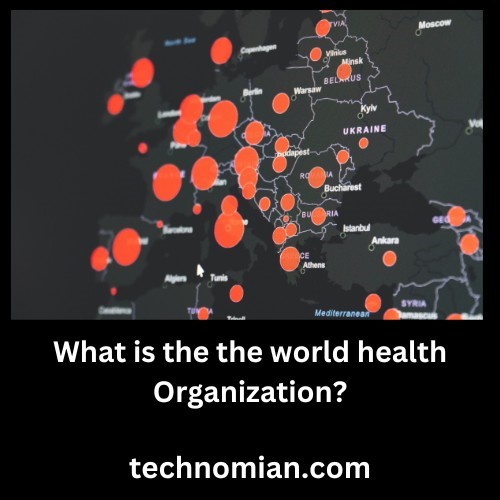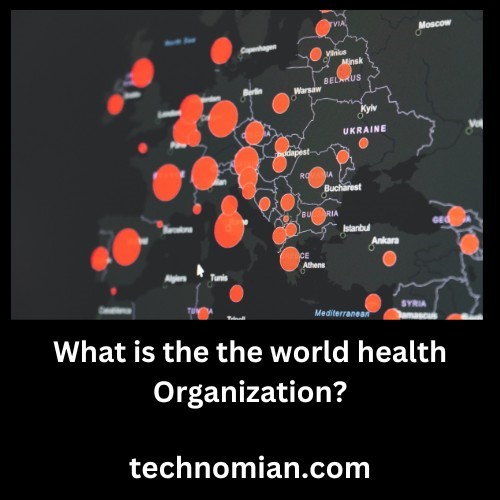What is the the world health Organization?

The world health Organization (WHO) is an intergovernmental organization whose mission is to promote and protect health worldwide.
The World Health Organization is an intergovernmental organization that carries out the strategies and activities set out in its constitution.
The the world health Organization (WHO) is a WHO represents 193 member states of the United Nations, and its headquarters are located in Geneva, Switzerland. The main goal of this UN organization is to improve human health worldwide by protecting people from diseases, promoting healthy living and environmental protection.
The World Health Organization is an organization of 191 member states and the European Union, established to protect, promote and restore health on a global scale.
What is the main purpose of the world health Organization?
The main purpose of the World Health Organization (WHO) is to help countries in the world improve their health and well-being, prevent disease, and promote health for all.
The main purpose of the World Health Organization is to help promote, protect and improve health around the world. This includes promoting good health practices and ensuring access to essential health care.
The main purpose of the world health Organization is to improve health and health services around the world. It does this by helping to prevent disease and injury, promote health through education and training, ensure access to essential medicines and vaccines, monitor and report on health-related issues particularly within developing countries.
The main purpose of WHO is to provide leadership and support to countries around the world to improve health. This can be achieved through advocacy, capacity building and innovative policy development activities.
What is the definition of World Health Organization?
World Health Organization is an international organization whose mission is to strengthen health by preventing and protecting the health of people, inspiring healthy life.
The World Health Organization is the principal United Nations agency dedicated to promoting health worldwide and protecting public health through education, innovation, and access to essential medicines.
World Health Organization (WHO) is an intergovernmental organization that provides expert advice and support to governments, both developed and developing. Importantly, their aim is to promote health for all people around the world by helping to address underlying determinants of health, including poverty and inequality.
World Health Organization is an agency of the United Nations (UN) that works to improve health around the world by promoting health, promoting better health and preventing disease and disability. The agency’s goals include reducing mortality from preventable diseases and injuries; increasing life expectancy; improving maternal, newborn and child health; ensuring access to quality medicines for those who need them; and protecting people’s rights in reproductive health care, antenatal and postnatal care, family planning and education for healthy pregnancies, births and protecting children
What are the five functions of WHO?
Five functions of WHO is to protect human health and promote sustainable development.
The five functions of WHO are to prevent and control disease, promote health and wellbeing, protect people from injury and care for the dying.
WHO is made up of five functional groups that are the following:
The functions of WHO are: 1. It’s global healthcare system 2. It provides international health agencies 3. It is responsible for the development of multilateral initiatives 4. It is responsible for cooperation with national institutions 5. It helps countries with technical assistance as well as supports scientific research in public health
Why was the world health Organization created?
The World Health Organization (WHO) was created to provide leadership in global health and development issues, promote health by preventing disease and promoting health, improve patient care through world-wide collaboration, reduce the prevalence of avoidable death from hazards that threaten human life.
The World Health Organization (WHO) was created to help the world reduce inequalities in health and improve the health of all people. In particular, it aims to reduce the number of deaths from diseases such as HIV/AIDS and tuberculosis; improve child survival; protect women’s reproductive health, and better understand why people get sick in order to develop new treatments and vaccines.
The World Health Organization (WHO) was created in 1948 to promote health through international collaboration and action. Its governing bodies include the World Health Assembly and its Board of Management, which is responsible for appointing representatives from member countries and establishing policies for WHO activities.
The creation of the World Health Organization (WHO) was prompted by a crisis in global health. In 1946, a team of scientists who had worked on the Manhattan Project to develop an atomic bomb joined together with researchers from other countries to create a new agency that would tackle the problems of disease, public health and nutrition throughout the world.
What are the 3 main goals of health system according to WHO?
According to WHO, the three main goals of health systems are to prevent illness and death, improve quality of life and survival, and effective health care delivery.
According to WHO, the three main goals of health system are prevention, promotion and protection. Preventive measures are aimed at the early detection and treatment of disease, which is essential for survival. Prevention also helps to protect individuals from harmful substances in the environment; promotion refers to efforts to improve general health through education and information dissemination; finally, protective actions are conducted when individuals become sick or injured due to accidents or occupational hazards.
WHO, in its report “Health System Reform for Sustainable Development,” wrote that three main goals of health system are quality, equity and affordability.
The main goals of health system according to WHO are: prevention, treatment, and promotion. Prevention includes looking out for the symptoms and illnesses caused by bad habits such as smoking, eating unhealthy foods and having unsafe sex. Treatment includes
finding out what is causing the illness and treating it or preventing it from happening again (like vaccinations). The final goal is promotion which encourages people to take care of themselves by staying healthy
WHO is the main person in WHO?
WHO is the main person in WHO? The World Health Organization (WHO) is an international organization whose primary mission is to promote health and quality of life around the globe. WHO also provides assistance to member states to establish a national health system as part of their broader efforts to improve healthcare worldwide.
WHO is the main person in WHO? The International Health Organization, also called IHO. The IHO is composed of many countries and is responsible for all areas of health, including global development and sustainable health.
WHO is the main person in WHO? The Director-General of WHO is the driving force behind all of its programs. He also heads up a number of committees, most notably one on Drugs and another on Mental Health. Lastly, he always has to answer to member states about how well the organization works with their countries during health emergencies.
WHO is an organization that was founded in 1948 by the World Health Assembly, who has its headquarters in Geneva, Switzerland. It’s goal is to promote health around the world by communicating research results and advocating for public health issues, providing technical assistance and training, and monitoring international policies related to prevention of communicable diseases
What are the types of health by WHO?
The World Health Organization (WHO) divides health into four categories.
There are five different types of health by WHO. These types include physical, mental and social conditions that can lead to disability or death.
There are about 7 types of health by WHO including genetic and environmental factors, lifestyle, physical and mental health, community and environment.
The types of health include physical and mental health. Physical health is a person’s ability to function in all aspects of life, from basic movement and speech to the understanding of their surroundings. Mental health refers to an individual’s emotional state and ability to cope with stressors and mental illness.
What is the vision and mission of WHO?
The vision and mission of WHO is to promote and protect health worldwide, in partnership with all countries.
The vision of WHO is a world-wide movement in health, nutrition and food safety to achieve better health for all. The mission of WHO is to improve health through the effective delivery of health services and programmes, on a principled basis that seeks to address equity and multiculturalism, with emphasis on developing countries while strengthening global solidarity in crisis situations.
The vision of WHO is a world where people live in health and wellbeing, free from the threat of global epidemics. The mission is to lead and coordinate international efforts related to health, education and nutrition for all
The World Health Organization (WHO) is a specialised agency of the United Nations that works to improve health around the world. The organization aims to reduce the burden of disease, disability and death caused by non-communicable disorders by promoting health through public policies and global action on physical educationAlcohol Water Food
Which country is not a member of WHO?
Which country is not a member of WHO? The Republic of Ireland is a member of WHO. Pakistan is not a member of the WHO.
The country that is not a member of WHO is Turkmenistan. The country that is not a member of WHO is Turkmenistan.
This means that WHO does not have any legal power to enforce laws, but instead deals with wider health issues and new emerging diseases such as Zika and Ebola.
